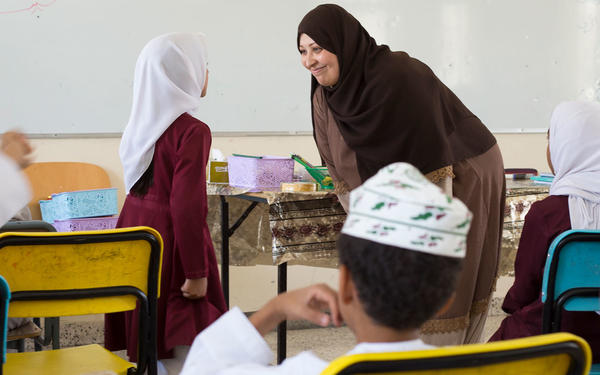Impact of our work in Oman
The Oman Ministry of Education (the Ministry) set out to transform the teaching and learning of mathematics and science in state schools to enhance quality of education and prepare students for higher education and career life. They aimed to do so by incorporating international best practices and modern pedagogy whilst reflecting Oman’s distinct culture and values in the learning approaches.

The Ministry appointed Cambridge to help with the transformation programme. Cambridge Partnership for Education, the dedicated unit in Cambridge that works with governments, has been working closely with the Ministry to tackle multiple areas of the reform; curriculum, assessment, resources, teachers training and stakeholder communication to ensure the community engages with and understands the reform changes. They launched the new curriculum in 1,125 schools in August 2017 and have been adding new grades each subsequent year.
At Cambridge, one of our goals when working with governments is to demonstrate results, provide information that supports future decision making and contribute to achieving the UN sustainable development agenda. That is why we have created the Cambridge Partnership for Education Impact Framework. Externally validated, the framework measures the effectiveness of our technical solutions across several indicators to track progress. We have been speaking with education stakeholders in Oman to find out what impact this programme has had over the past 5 years across curriculum, teacher training and resources indicators of the Framework.
Curriculum effectiveness
An effective curriculum is evidence-based, meets the governments’ objectives, and reflects the local culture and values. The new curriculum has been designed to align to the Ministry curriculum documents and the national policies. Teachers also agree it meets the local needs with one teacher saying, “with Cambridge curriculum my students have been contributing to building their own understanding, discovering knowledge through inquiry-based learning that motivates them to explore, predict and deduce information.”
There is also a general sense that there are improved engagement levels with the curriculum. For example, a Physics supervisor said to us that “the abilities of students to solve high-demand questions have developed significantly confirming that the creative, positive and scientific-thinking approach in problem solving in these curricula indeed suited the students well.”
Pedagogy (teaching methodology & practices)
An effective pedagogy works for all learners and is aligned to the curriculum framework. When we train teachers, we aim to develop their capacity so they can change the approach in classroom practice, embedding active learning and promoting the development of scientific inquiry skills and mathematical problem-solving skills.
Through the teacher training programme, many teachers can now demonstrate innovate and effective classroom practice. Participants reported that because of the training, they felt more confident in their abilities to host active learning sessions. They also reported that the training had improved aspects of their understanding – and hence classroom practice. One teacher said “as a result of flipped classroom learning the actual class time could be used to discuss what the student has learned, and the questions are solved by modelling the answers during the teaching process. Thus, a large amount of class time can be saved and utilized efficiently to cover the topics of the book.”
Our goal goes beyond developing the team’s skills. We ensure all our capacity development programmes are sustainable to achieve continued success. When sustainability is embedded, it encourages training /communicating the learnt approaches to other stakeholders, for example, between teachers and parents resulting to increased parental satisfaction. Schools we visited confirmed that following the Cambridge work with teachers, almost all students do their tasks and come to class prepared, because their parents engage in the group, with the teachers, and they will follow up with them at home.
Teaching & learning resources effectiveness
We develop teaching and learning resources that align to the curriculum and the local context. All our resources are designed to engage students and develop creativity, knowledge, and skills. They also support teachers in planning lessons and provide a foundation level of support for newly qualified or generalist teachers.
The stakeholders we interviewed rated the satisfaction of the quality of resources as high. “The generous number of questions included in the resources saves the teacher time and effort to plan the lesson and choose the required exercises and activities as needed according to the teaching-learning context, either for the whole class or for specific students,” a supervisor said.
Impact internationally
The adoption of the Cambridge curriculum by Oman was highlighted in TIMSS (Trends in International Mathematics and Science Study) 2019, where there had been an improvement in performance from TIMSS 2015 after just one year of the adoption of the Cambridge curriculum at Grade 4.
The first cohort of Grade 10 students began in late August 2021. The reform has reached around 500,000 students to date.
This is just the beginning of our journey with the Cambridge Partnership for Education Impact Framework. For the Oman programme, we intend to continue measuring across the rest of the framework indicators and reporting on the success of the entire project as we work across Grades 11 and 12.
